Fear and loathing returns for Quetta’s Hazara community
As Quetta’s security situation shows few signs of improving, Hazaras continue leaving for safer shores
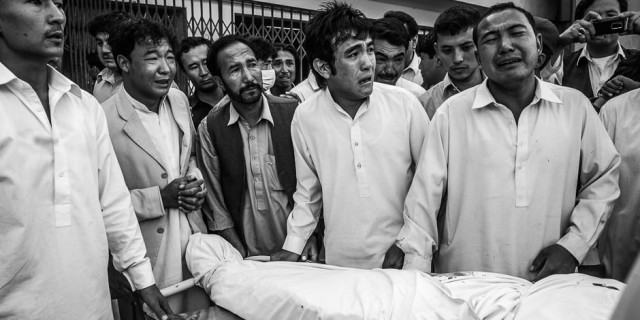

And when you can’t hide – you run. This is the main reason why Shia Hazara businessmen, professionals and students from Quetta are leaving for Pakistan’s big cities: Karachi, Lahore, Islamabad and Rawalpindi.
In the sea of people that make up a large city, a Hazara becomes just another face in the crowd. The luxury of anonymity is something they do not have in their native Quetta.
Three Hazaras among five dead in gun attack on Quetta van
As Quetta’s security situation shows few signs of improving – with the latest attack on vegetable vendors on October 9, 2017 – the city will continue experiencing an economic and intellectual flight in the coming years. In the latest incident, two men on a motorcycle fired at a van carrying vegetable sellers, killing five people, including three Hazaras. The victims were going to purchase vegetables for their shops located on Alamdar Road, Marriabad. The vehicle came under attack when they reached Allah Dina Street on Kasi Road. The gunmen fled the scene.
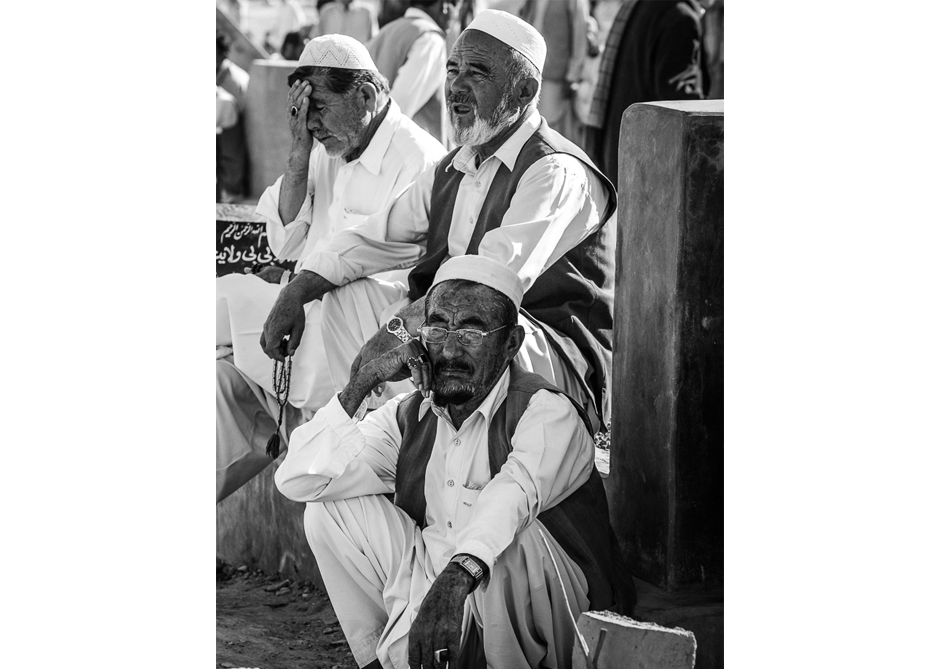
Chief of the Hazara Qoumi Jirga, Qayoum Changezi, said believes it was a result of the administration’s[SF1] negligence. because it was decided to escort vegetable vendors but today they were not escorted and terrorists easily attacked them and fled.
The attack left terror in its wake: reopening old wounds and raising questions about safety and security, particularly by the Hazara business community.
“We cannot travel outside community boundaries as we are under threat all the times,” laments Abdul Hameed, a Hazara fresh juice shop owner on Alamdar Road. “We are not only losing precious human life, but our business has been destroyed as well.” Hameed was previously running a shop outside Marriabad, but had to shut it down, due to security threats.
Another shopkeeper, Rajab Ali, reiterates the same concern. “We cannot even travel to Kasi Road for business anymore. We have to pay more for the transportation of products from markets outside of Quetta, which costs us a lot,” he says.
And it is not just business that is suffering; many students are leaving for other cities and countries for their higher studies. “I fled the systematic killing of my community in Balochistan,” says Imran Manzoor, a Masters student at National Defence University in Islamabad. “Living in Quetta is tantamount to risking my life everyday --- which is not worth it.”

Since 2002, at least 2,679 Shia Muslims have been killed in an unrelenting campaign of targeted attacks and bombings in Pakistan, according to South Asia Terrorism Portal. Since 2012, attacks against the ethnic Hazara community, have been on the rise. Hazara casualties include everyone from students and government employees to sportsmen.
Four Hazaras killed in Mastung ambush
“We are targeted almost every corner of the city and there are some spots where deadly attacks take place frequently,” says Muhammad Raza Wakeel, Senior Vice Chairman of Hazara Democratic Party.
Wakeel adds that the attacks on Hazara actually started in 1999, when a local transport was attacked in Hazara Town; seven people were killed. Sometime after the incident, Baluchistan’s Minister for Education, Sardar Nisar Hazara, was attacked and his bodyguard and driver killed.
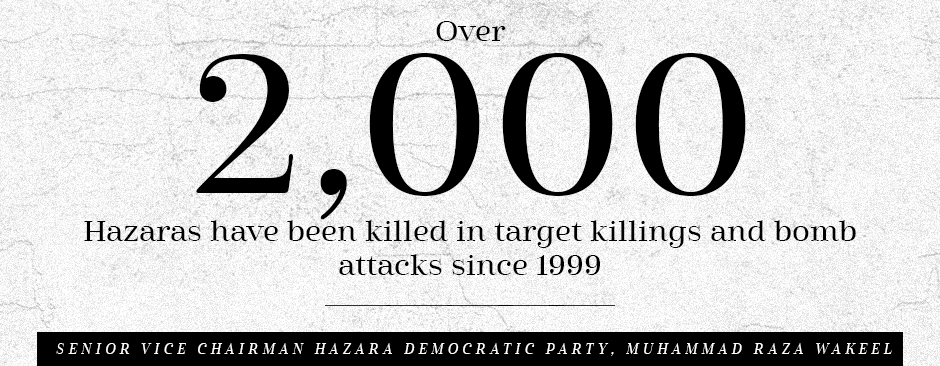
Hazaras had no choice but to ghettoise themselves. The community is restricted to two neighborhoods in Quetta: Hazara Town and Marriabad, which inhabitants sometimes refer to as “prisons”. The neighborhoods are surrounded by paramilitary troops and people have to show their identity card and answer several questions each time they enter and exit.
But now they are exiting --- for good, and in greater numbers. More than 40 thousand Hazaras are said to have left the country. Many of them are detained in jails in Indonesia and Malaysia, and about 500 Hazara are missing, likely to have drowned in the sea.
Two Hazara community members gunned down in Quetta
The risks and costs of leaving the country are high, which is another reason why Hazaras prefer to stay within the country. But not everyone can afford even that. “Our children are deprived from education, as not many of us can afford to send our children to Islamabad, Lahore and Karachi,” says Wakeel.
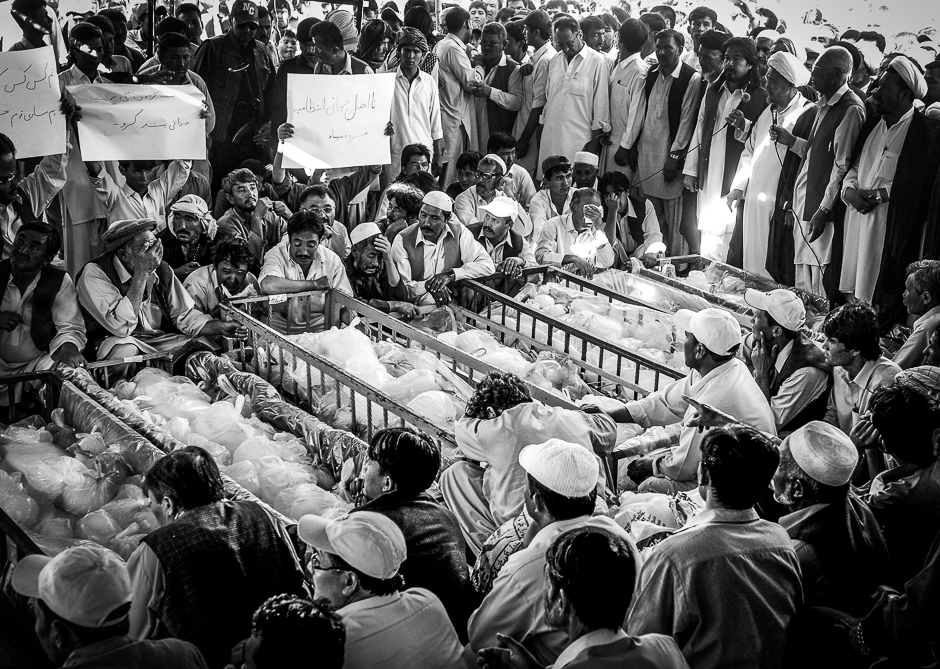
There are issues in their new cities as well. Manzoor, for instance, said he would have preferred to study at University of Balochistan, which is close to his house in Quetta. “Now I am about 900 km far from my home in Islamabad.”
Manzoor does not believe that killings are taking place solely because of religion. “These are politically and economically motivated murders,” he opines.
The Home Department of Balochistan’s records show otherwise. Those arrested or charged with killings of Hazaras have nearly all had affiliation with sectarian terrorist groups, which are based in Punjab, but operate in rest of the country. In the the past eight years, 123 attacks – resulting in 776 killed and 1,115 injured – had been claimed on sectarian grounds.
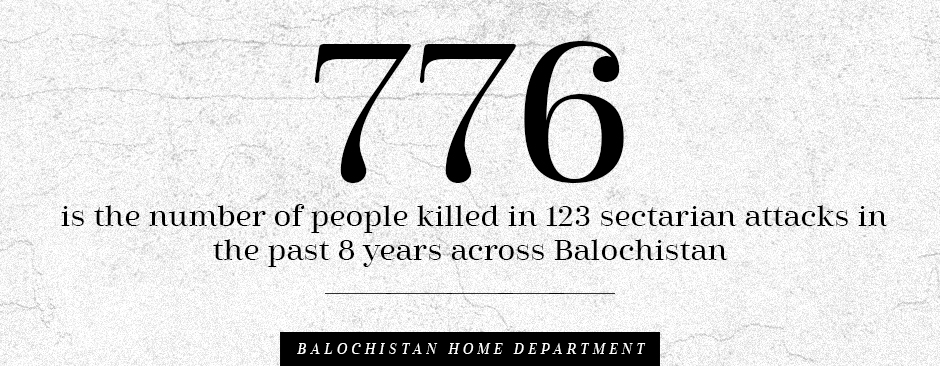
The mostly deadly year was 2013, during which at least 11 attacks were reported, resulting in 239 dead and 400 wounded. And in 2012, over 59 attacks took place, in which 159 people were killed.
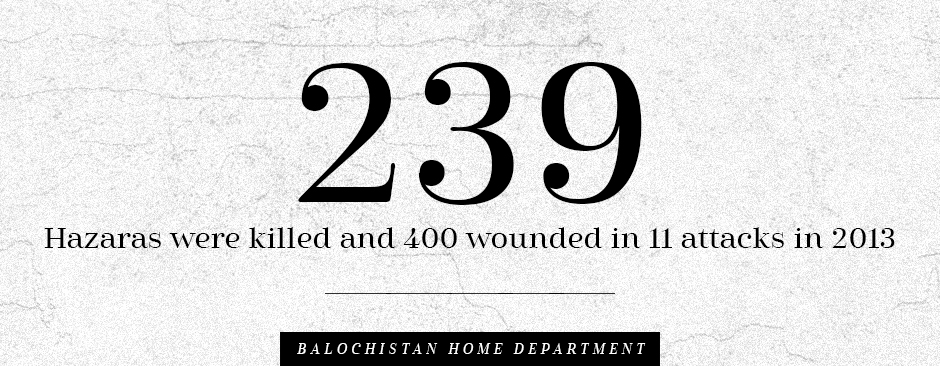
Commenting on the recent targeted attack on vegetable vendors, Deputy Inspector General (Quetta), Abdul Razzaq Cheema, says that the police are providing security to those who are informing and seeking security from law enforcers. “Frontier Corps, paramilitary troops and police are always available to help and assist the public. Those recently attacked and killed by terrorists actually had not informed law enforcers about their movement,” Cheema says, somewhat callously. To add insult to injury, he adds that the two neighborhoods where the Hazara community lives “are completely protected and foolproof security is being provided to them.”
The Hazaras are not convinced. Wakeel mentions how many Hazaras who were working in Civil Secretariat and other government organisations had to quit their jobs because of the threat to their lives. “We are concerned about our security. If government knows who is behind these attacks, then why do they not take measures to stop them?” he asks. “We are told that about 26 secret security agencies are working in Pakistan. Is there no coordination between them? We have been attacked in the same places (such as Spiny Road) many times. Police and deployed on this road, but still they cannot do anything,” he said.
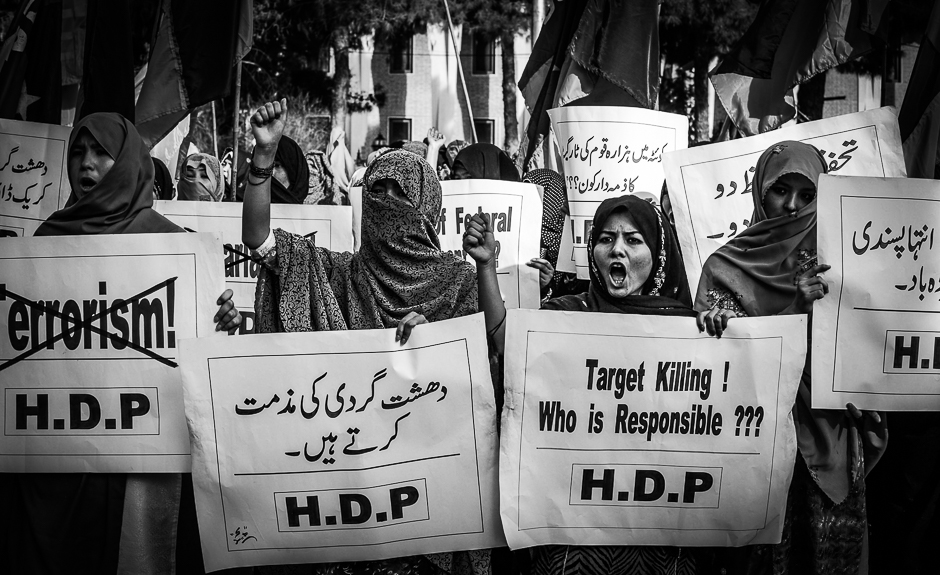
Balochistan Home Minister Sarfraz Bugti said that the provincial government has carried out operations against terrorists’ camps in the outskirts of the provincial capital. “Terrorists like Saifullah Kurd and Mehmood-ur-Rehman were killed by security forces operation… We will continue our operation against them till the very end,” he said.
He gave the example of Shia pilgrims, who were frequently attacked in the past. There was an attack on pilgrims in 2015, but not since. He blamed foreign agents for destabilising Balochistan, and urged for unity amongst Balochistan’s various ethnicities.
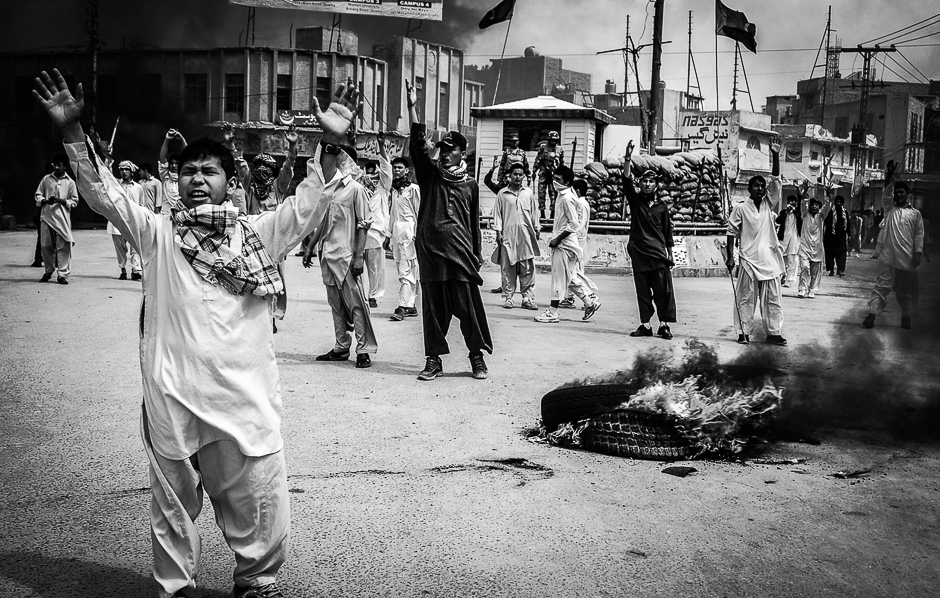
“There was a pause in Hazara killing from a specific period and we assumed that the provincial government has really destroyed terrorists’ hideouts,” said chief of the Hazara Qoumi Jirga, Qayoum Changezi. The recent attacks have changed that perspective.
“We are afraid the attacks will increase if the government continues to be neglectful. It might be us today, tomorrow it will be someone else.”
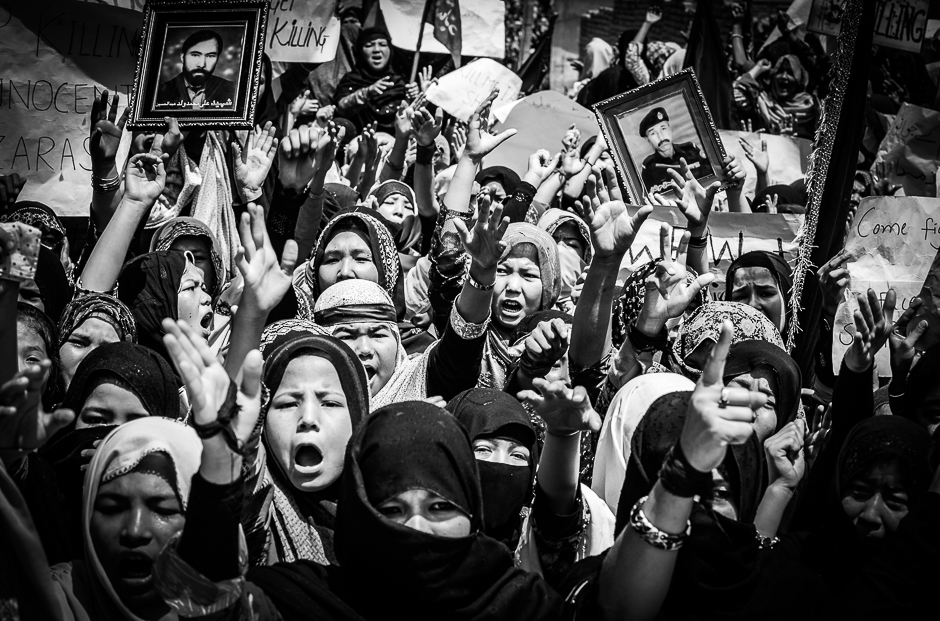


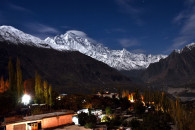
















COMMENTS
Comments are moderated and generally will be posted if they are on-topic and not abusive.
For more information, please see our Comments FAQ